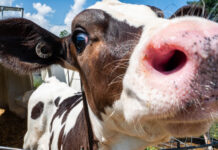If a tree falls in the forest with nobody around, can a Starbucks, two video stores and a housing development be built before anyone hears it? It appears that the answer is “yes.”
Losing farmland. Increasingly, and alarmingly, U.S. farmland is being lost to urban and suburban sprawl. Like dandelions, communities with fantasy names such as Forest Hills and Deer Run pop up seemingly overnight where farmland once held strong.
Never mind that despite the fanciful monikers no flora or fauna have been spotted since the first bull dozers showed up. It’s more about ambiance than actuality.
This encroachment of civilization gone mad is certainly born of love and good intentions. Urban and suburban sprawl occurs when humans leave the city behind and embrace the pristine space and seclusion of a rural region.
Doesn’t make sense. Ironically, the populace flocks to the country en masse and as a result completely destroys the rural setting that was so alluring in the first place.
It’s rather like saying that you adore the unspoiled magnificence of the Grand Canyon so much that you’d like to fill it in, develop condos atop the site, and live there year-round.
Unfortunately, when the masses flee metropolis for life in the country, the lifestyle left behind is not escaped so much as it is dragged along behind in little red wagon fashion.
Pick-up, not delivery. Soon our fearless transplants to country life have morphed into a burgeoning populace for whom rural seclusion is a real bummer.
All too soon, the separation from civilization that beckoned them into the back 40 becomes an impossible inconvenience.
Akin to living in a third world country without benefit of United Nations troops to airdrop the videos, pizza, and Super Lotto tickets needed to sustain our modern day lives.
Who wants to drive 15 minutes for a half gallon of milk after all?
Better to bring in a convenience store or two, with the understanding that just as the shin bone is connected to the knee bone, so too the convenience store and video-rama are connected to the Super WalMart and the cineplex.
Good-bye Old McDonald had a farm. Hello McDonald’s – do you want fries with that?
Crying foul. All too soon new community groups will mobilize to cry that the trouble with rural life is that the livestock smells, the tractors are too loud, and roosters are a menace to decent society (and sleeping late on weekends!)
Before you can say “John Deere” there are ordinances for everything and even your cow has to be kept on a leash. The closest anyone will get to farming is the lawn tractor display down at the WalMart.
To be fair, new blood and fresh ideas are welcome and necessary everywhere. However, there is a delicate balance between welcoming those who truly embrace rural life, and holding off those who are scouting out the next affordable site for a strip mall.
Whatever the root of this rush to claim rural America in the name of all that is suburban, the pervasive lure to develop the pastoral idyll is hard to squash. Literally.
Nice place to visit… Even filling a visitor’s entire back seat with zucchini until they cry “Uncle” might not be enough to convince them that the country is a nice place to visit, but they wouldn’t want to live here. Although it never hurts to try.
Meanwhile, until we put suburbia back where it belongs, the loss of our nation’s farmland will continue unchecked.
We’ll all have 3,000 square foot colonial homes growing like proverbial weeds in former farm fields and there will be a handy drive-thru on every corner.
Unfortunately, that gallon of milk will cost $17.50 because it’s imported from overseas. Progress, after all, has a price.
What to do. Of course, we could just ignore the problem and let nature take its course (or be bulldozed trying). Within a generation we won’t need to worry about the effect of unchecked progress on life in rural America after all. Rural America won’t be here anymore.
It’s too bad really. “Old McDonald went to the mall” doesn’t have nearly the same ring.
(Kymberly Foster Seabolt lives in rural America and cherishes cows, tractors, the occasional sheep and yes, even her husband’s pigs. She welcomes comments c/o P.O. Box 38, Salem, OH 44460 or kseabolt@epohi.com.)












